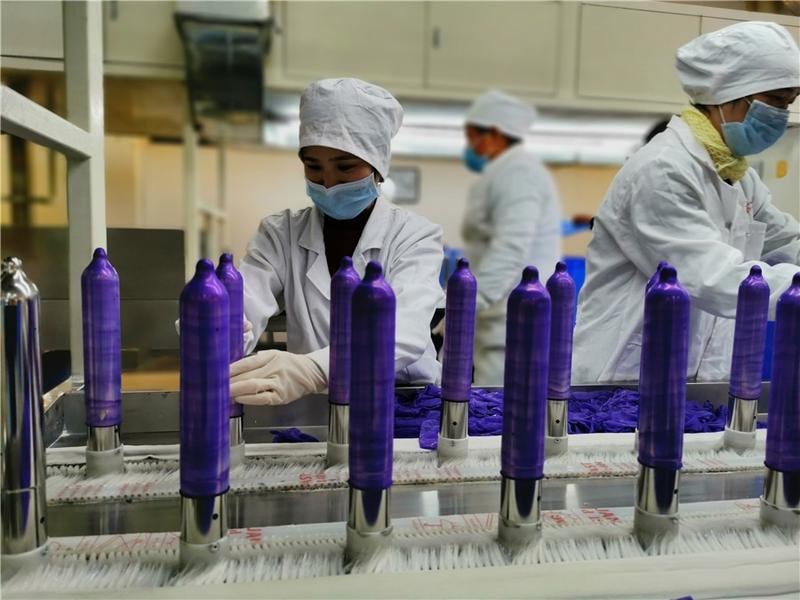 Workers pack latex gloves at a workshop of Guilin HBM Health Protection Ltd in Guilin, Guangxi Zhuang autonomous region. (PROVIDED TO CHINA DAILY)
Workers pack latex gloves at a workshop of Guilin HBM Health Protection Ltd in Guilin, Guangxi Zhuang autonomous region. (PROVIDED TO CHINA DAILY)
By 2024-end, several new health protection products of Guilin HBM Health Protection Ltd will have likely won over overseas clients as the firm is keen to stand out in a fiercely competitive market.
Since condoms can reduce the risk of exposure to AIDS-causing HIV, Guilin HBM began to focus on R&D in 2009 with the goal of making its products highly effective against HIV
The privately held firm is based in Guangxi Zhuang autonomous region. It is known for its condoms and medical gloves among other health protection products.
By 2022-end, the company wants to turn itself into a leading Chinese brand in terms of scale, reputation and technology, said Hu Zhiqiang, its general manager.
Condom production is not considered a technology-intensive industry. But Guilin HBM currently holds more than 50 national patents. It plans to increase its investment in research and development from 2 percent of the cost to 5 percent, according to Hu.
ALSO READ: Stay-healthy lifestyle spawns a big demand
Since condoms can reduce the risk of exposure to AIDS-causing HIV, Guilin HBM began to focus on R&D in 2009 with the goal of making its products highly effective against HIV. "Ordinary condoms only prevent 97.4 percent of HIV penetration. Do not underestimate the failure rate of 2.6 percent," said Hu.
After a decade-long endeavor, the company developed a type of three-layered condom, whose production started last year. The product has a 99.7-percent barrier rate against AIDS, according to a test conducted at an institute of the Chinese Academy of Sciences.
The breakthrough helped Guilin HBM gain a toehold in the tough global market. The company has a total production capacity of 600 million pieces each year, 400 million of which were exported to countries like France, Italy, Russia, the Netherlands and South Africa.
Overall in China, the annual output capacity is about 5 billion condoms, 20 percent of which are exported, according to data from the China Rubber Industry Association.
During the past two decades of Guilin HBM's overseas expansion, a notable milestone was its partnership with a South African firm. In 2017, the company assisted in constructing the Latex Industries SA, the African country's first modern plant for condom production.
 Employees at Guilin HBM Health Protection Ltd use electronic leak meter to test the newly produced condoms.(PROVIDED TO CHINA DAILY)
Employees at Guilin HBM Health Protection Ltd use electronic leak meter to test the newly produced condoms.(PROVIDED TO CHINA DAILY)
Sibusiso Thembinkosi, legal representative of Latex Industries, said HIV/AIDS is a major challenge facing South Africa. With a population of 59 million, South Africa purchases about 1 billion male condoms and 40 million female condoms from the world each year, Thembinkosi said during a business trip to Guilin.
Condom production requires special equipment and technology, he said, adding that constrained by technology, South Africa had no modern condom factory before.
According to data from the Joint United Nations Programme on HIV and AIDS or UNAIDS, 7.7 million people in South Africa were living with HIV, while HIV prevalence-the percentage of people living with HIV-among adults (aged 15 to 49) was 20.4 percent.
UNAIDS said there has been significant reduction in the number of AIDS-related deaths in South Africa since 2010. In fact, the almost 50-percent decrease to 71,000 deaths can be attributed to a certain extent to the growing use of condoms.
For the health of people, Nelavani Ranchhod, a manager of Latex, traveled three times to China to study the condom industry.
In 2015, when she first came into contact with Guilin HBM, Ranchhod was deeply impressed by the Chinese company's highly efficient modern condom production facilities. "It is a very good timing for companies in both countries to jointly build a production base that has never existed in South Africa," she said.
At that time, the African country's enhanced efforts to construct its own industrial system also facilitated the partnership between the two companies.
Hu from Guilin HBM said: "Our company exported advanced, fullyautomated production lines to this project in South Africa. We sent excellent technicians to install the equipment, and assigned outstanding executives to offer free training to middle-level managers of the South African factory."
In 2017, the South Africa-based condom factory, using the same production standards as those of Guilin HBM, began operations successfully. Later that year, it delivered the first batch of high-quality condoms to the government for distribution to people in need.
Thanks to the joint efforts, consumers in South Africa can finally have world-class condoms made domestically. "None of this could have been possible without the support of Chinese companies," Thembinkosi said.
The first-phase construction of Latex cost US$5 million, and its annual output of condoms exceeded 300 million pieces. But the capacity is not yet enough.
READ MORE: 'Novel remedies' for economy evolve in China as epidemic bites
In August 2019, a delegation of Latex paid another visit to Guilin, seeking support from Chinese companies for the second-phase construction and higher-level cooperation. Both sides discussed the feasibility of introducing more products with cutting-edge technology to South Africa.
Hu said Guilin HBM will accelerate the feasibility study on exporting the products to South Africa and then the entire African market.
Li Ziyu contributed to the story.


